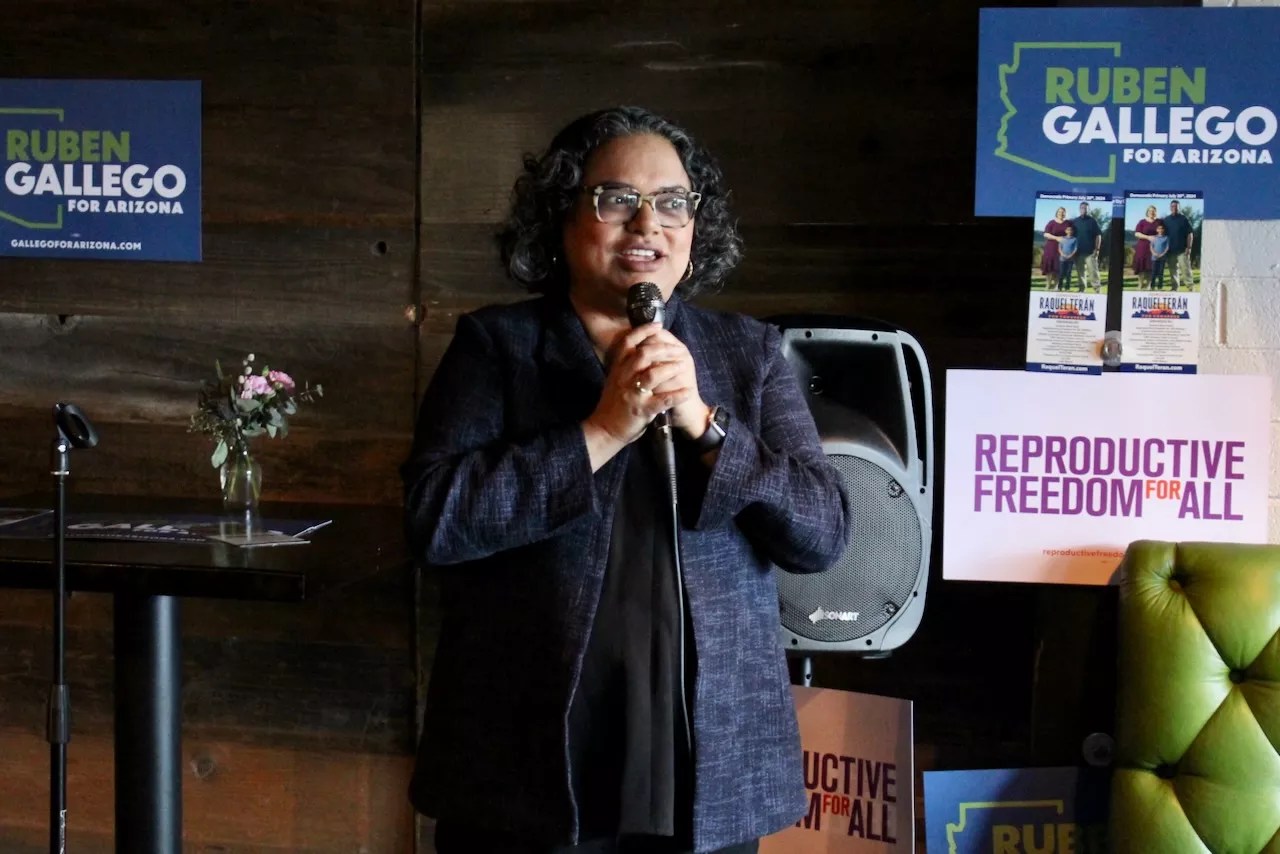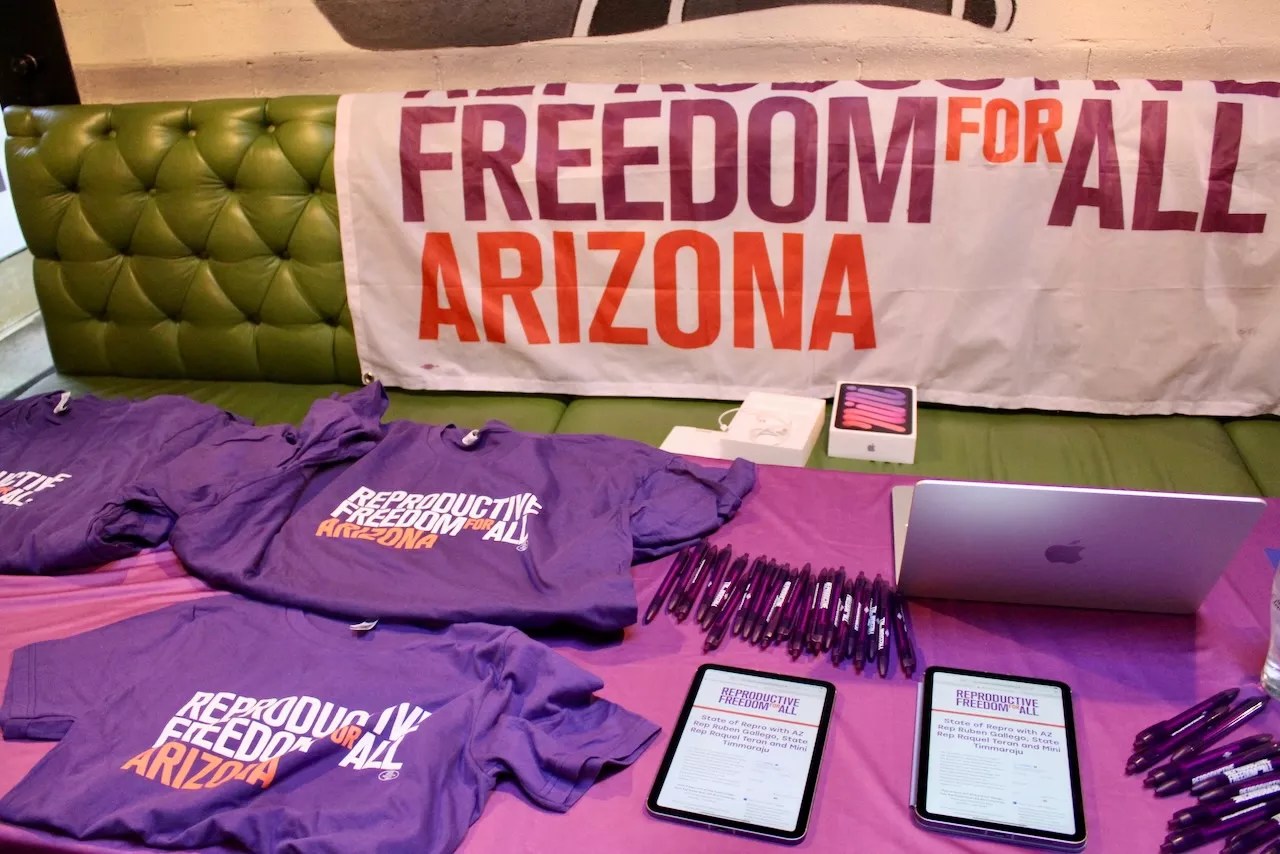
TJ L’Heureux

Audio By Carbonatix
It may come as a surprise to many Arizonans that conservative Republicans played a role in creating one of the state’s first birth control clinics, which later merged with Planned Parenthood, the largest provider of reproductive health care and abortions in the U.S.
Mother’s Health Clinic, the first birth control clinic in Phoenix, was opened in 1937 thanks to the work of a group of activist women that included Peggy Goldwater. Over time, a network of clinics developed and became Planned Parenthood of Arizona, providing contraception and abortion services to all women after doing so became legal in 1973.
Goldwater was the wife of Barry Goldwater, who would become a conservative icon, presidential candidate and U.S. senator representing Arizona for 30 years. He was a stalwart opponent of government overreach into the private lives of civilians and believed abortion was a matter of personal choice, one in which the government should not have a say. He even helped paint the walls of Mother’s Health Clinic before it opened.
The senator fought the GOP’s hardline stance on abortion well into his 80s.
How the political winds have changed in Arizona.
The Supreme Court’s overturning of Roe v. Wade in 2022 brought about a chaotic struggle in Arizona, as well as the U.S., in which Democrats are working to guarantee abortion rights and Republicans want to thwart laws establishing reproductive freedom.
The right to abortion, contraception and reproductive freedom are front and center in the courts, presidential race, state legislative campaigns and ballot initiatives.
In Arizona, the state Supreme Court could decide any day which of two extreme laws will have supremacy: A 2022 law that bans abortion after 15 weeks or an 1864 law that bans abortion outright, even in cases of rape or incest.
A measure on the November ballot could enshrine reproductive rights into the Arizona Constitution. On March 13, the GOP-controlled Arizona Legislature blocked attempts by Democrats to force a vote on contraception access.
And in the high-profile U.S. Senate race in Arizona, reproductive rights is a defining issue between U.S. Rep. Ruben Gallego, a Phoenix Democrat, and Republican Kari Lake.
“It’s scary to think that an American right now has less rights over their body than an American 40 years ago,” Gallego said during a Feb. 21 event at Phoenix’s The Other Bar with Reproductive Freedom for All, a nonprofit that advocates against restrictions on abortions.

Mini Timmaraju, president of Reproductive Freedom for All, spoke at an event on Feb. 21 hosted by the organization at The Other Bar in north central Phoenix.
TJ L’Heureux
‘You can’t take your chances with Kari Lake’
During the Feb. 21 event, Mini Timmaraju, president of Reproductive Freedom for All, told Phoenix New Times that since Roe v. Wade’s demise, the issue is now about freedom, not choice.
“The choice/life binary was really effective for a long time but doesn’t actually apply anymore from an ethics perspective,” Timmaraju said. “It’s important in this moment to think about fundamental freedom to decide if, when and how to have a family.”
Reproductive Freedom for All is heavily focused on Arizona this election cycle for two main reasons: President Joe Biden’s reelection hinges on the state, and a victory for Gallego could help end the filibuster in the U.S. Senate, That, in turn, could open the door to passage of a bill guaranteeing reproductive freedom, which failed in 2022.
In Biden’s State of the Union address on March 7, he called on voters to elect leaders who could reinstate abortion rights across the country.
“If you, the American people, send me a Congress that supports the right to choose, I promise you, I will restore Roe v. Wade as the law of the land again,” Biden said.
Sen. Kyrsten Sinema, the Democrat-turned-independent who blocked her party’s effort to pass a law reinstating Roe v. Wade, announced on March 5 she will not run for a second term. That leaves the race to represent Arizona in the U.S. Senate between Gallego and Kari Lake, the Republican firebrand and sore loser of the 2022 race for governor who has been spending most of her time campaigning outside Arizona.
At the Feb. 21 event, Gallego struck a contrast between his consistent support for reproductive rights and Lake’s ever-changing stance.
“You can’t take your chances with Kari Lake,” Gallego said. “When she says, ‘I’m not for this. I’m for this now,’ how can you trust someone who only months ago was saying it’s OK to arrest providers of abortion care?”
Gallego said he would support an override of the filibuster to pass a national abortion rights bill. He highlighted his decades-long support for abortion rights, though he joked he did make one mistake when it comes to the issue: starting a group called Bros for Choice, which eventually changed to Men for Choice.
“This cannot just be a fight that women take on,” Gallego said. “There is no equality for women, for our families unless they have rights to control their bodies.”
Gallego told New Times that Democrats and abortion rights organizers can tap into Arizona’s libertarian roots for the November elections. A ballot initiative and numerous races will have a huge bearing on reproductive rights.
“We’re a Western state – we want government to stay out of our business. And I think this perfectly aligns with that,” Gallego said. “We want government to stay out of our families’ business, and I think the initiative is going to reflect that.”
While the Senate race garners attention, races for Arizona’s two House swing seats will play a role in which party controls that chamber.
The Arizona Republic highlighted how Rep. David Schweikert, a Scottsdale Republican who narrowly has maintained hold of the 1st District seat for years, has supported extreme legislation that defines a child as existing at the moment of fertilization.
U.S. Rep. Juan Ciscomani, a Tucson Republican who barely won election to the 6th District seat in 2022, co-sponsored House of Representatives 7, a bill that aimed to prohibit the use of tax credits to purchase insurance that covers abortion for women who are serving in the military, veterans covered under Medicaid, federal employees and those covered by the Indian Health Service.
Schweikert and Ciscomani also are members of the Republican Study Committee, which released a budget that endorsed a 15-week national abortion ban, as well as legislation that could allow states to eliminate access to contraception and in vitro fertilization, gut Social Security and Medicare and dismember the Affordable Care Act. About 80% of Republicans belong to the committee.
In a written statement, Ciscomani said he did not support all of the positions of the group.
“With any large coalition in Washington, there are a wide array of, and sometimes conflicting, points of view,” Ciscomani said. “The Republican Study Committee produces a number of commonsense provisions; however, I do not subscribe to every proposal they put out. What best reflects my perspectives are the votes I take, bills I introduced and legislation I co-sponsor.”
A Schweikert spokesperson did not respond to questions from New Times.
The Democratic National Committee has made reproductive freedom a focus of its advertising in Arizona and other battleground states. It launched a bilingual billboard campaign in late February that recalled that presumptive Republican nominee and former President Donald Trump bragged he was “able to kill Roe v. Wade.”
The DNC ads also tried to link Trump to the Feb. 16 ruling from the Alabama Supreme Court that embryos created through in vitro fertilization should be considered children. Trump has criticized the ruling and voiced support for IVF, but supports a national ban on abortion after 15 weeks.

Reproductive Freedom for All is one of several organizations focused on promoting reproductive rights in Arizona’s November 2024 elections.
TJ L’Heureux
Reproductive freedom on the ballot locally
While federal races in Arizona could decide what happens in Washington, local races and a potential ballot initiative could impact what happens in the state.
Both chambers of the Arizona Legislature, neither of which has been controlled by Democrats since 1992, are up for grabs. Republicans, who passed the 2022 law that banned abortion after 15 weeks, hold a slim one-vote majority in the House and Senate. If Democrats regain both houses, they could pass legislation that overturns the 2022 law.
On March 18, state Sen. Eva Burch, a Mesa Democrat, delivered a powerful address on the floor of the Senate, telling colleagues that she was going to get an abortion because her pregnancy no longer was viable.
Burch described the cruelty and absurdity of Arizona’s current laws. Burch was subjected to a transvaginal ultrasound, and her provider gave her a list of recommendations – an action mandated by state law – that included adoption alternatives even though doctors said the fetus has no chance of survival.
“The only reason I had to hear those things was a cruel and uninformed attempt by outside forces to shame and coerce and frighten me into making a different decision other than the one I knew was right for me,” she said. “There’s no one-size-fits-all script for people seeking abortion care, and the legislature doesn’t have any right to assign one.”
Arizona Democrats see several opportunities to oust antiabortion Republicans from their seats:
- Legislative District 2 in north Phoenix, where Republicans Rep. Shawnna Bolick and Sen. Justin Wilmeth serve alongside Democratic Rep. Judy Schwiebert.
- LD4 in North Phoenix, where Republican Rep. Matt Gress serves with two Democratic lawmakers.
- LD16 in Pinal County, where Republican Rep. Teresa Martinez serves with Democratic Rep. Keith Seaman.
- LD17 outside Tucson, where three extreme Republicans narrowly defeated Democrats.
The abortion access ballot initiative, if it makes it to the November ballot and voters approve it, would have the most immediate impact on abortion in Arizona. The measure, for which organizers are still gathering signatures, will allow voters to choose whether to enshrine reproductive rights in Arizona’s constitution. On Jan. 12, organizers were about halfway to the 500,000 signatures needed, though only approximately 384,000 unique and valid signatures are needed.
In Ohio, where Trump has dominated in presidential elections, a similar measure was approved by a wide margin. Antiabortion activists are scrambling to stop the measure from reaching Arizona’s ballot, fearing it will pass easily.
Timmaraju said the ballot initiative will drive voter turnout in support of other pro-reproductive freedom candidates in Arizona, including Gallego and Biden.
“You can’t count on a ballot initiative, but a ballot initiative can help connect the dots if you have candidates that make the case, as well,” Timmaraju said. “So the perfect thing is you have Ruben (Gallego) at the top of the ticket in the state and Joe Biden and Kamala Harris at the top of the ticket nationally.”